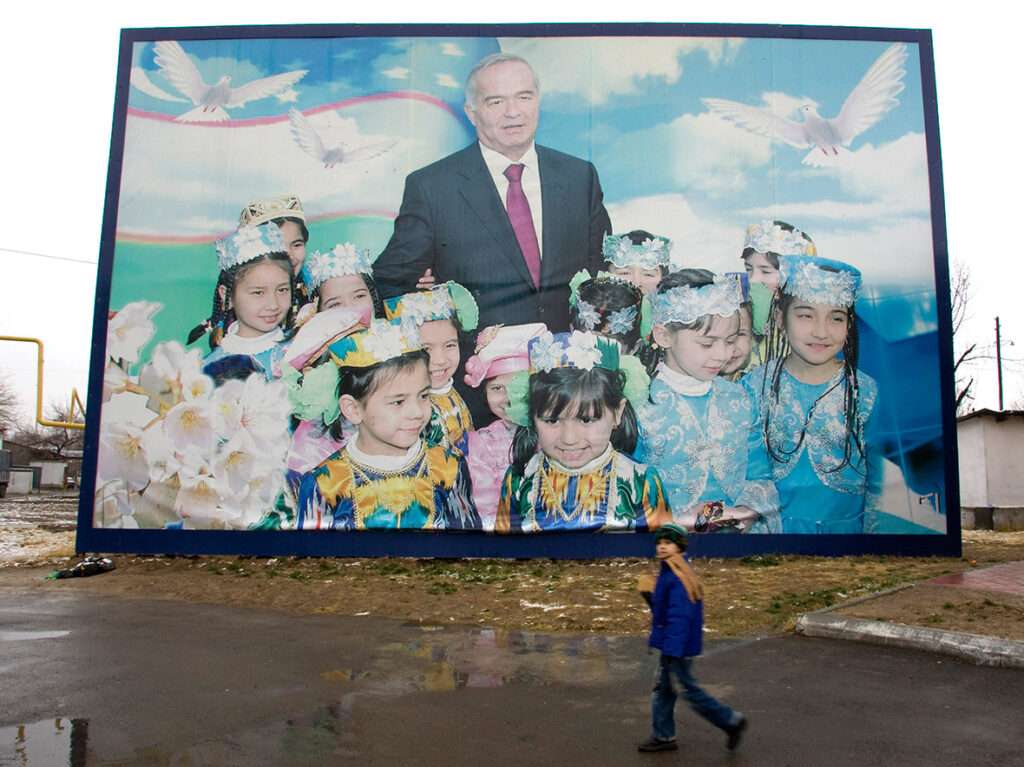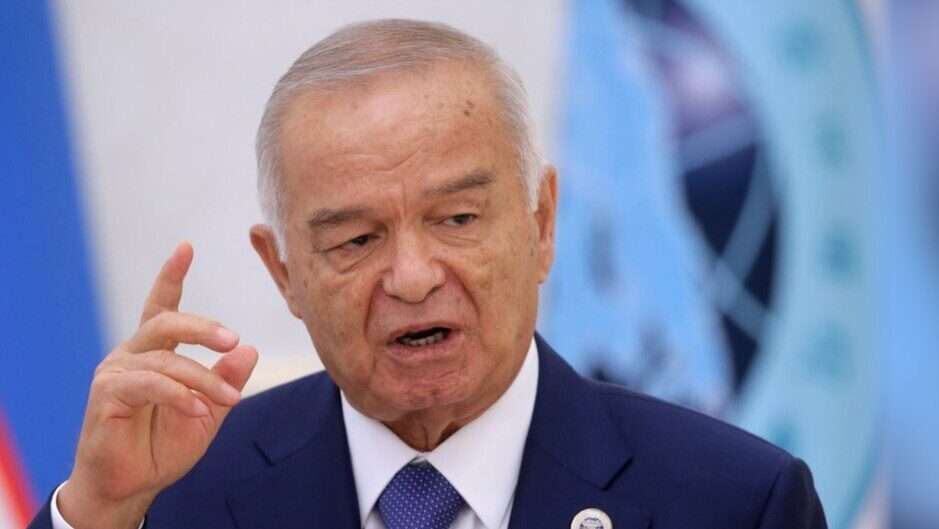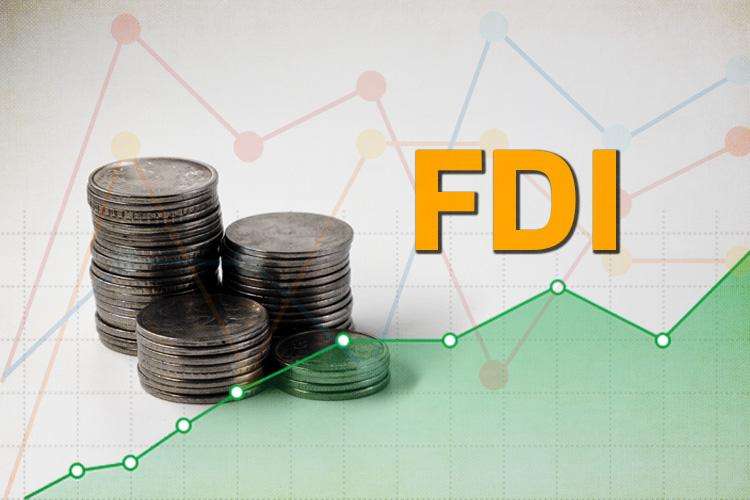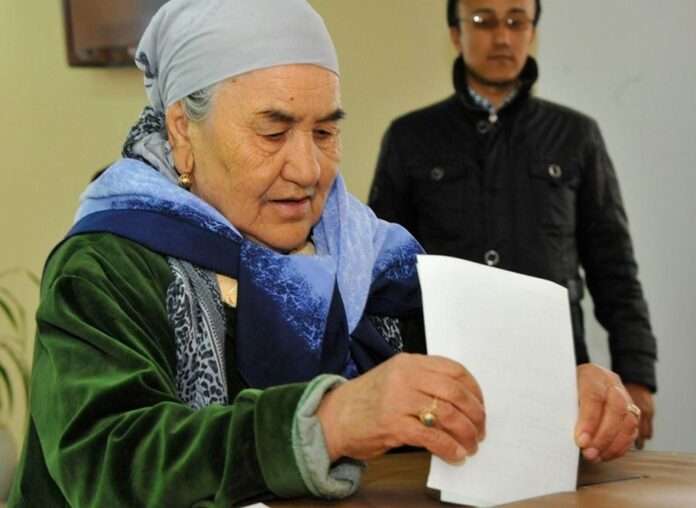Economic sustainability and political stability were the two main issues in the recently held presidential elections 2015 in the Republic of Uzbekistan. The voters rightly elected Islam Karimov for his miraculous socio-economic achievements in the past years. National security, societal harmony, continuation of financial and banking reforms also remained under serious consideration of the voters. Further, the deepening of constitutional reforms was also preferred in the voting patterns. Elements of reliability, accountability, maturity and charismatic personality made the choice easy for the voters and ultimately Islam Karimov won by a very big margin as compared to other candidates in the elections. Democracy won and western propaganda lost.
Uzbekistan on the Right Path of Democratization and Politicization
His victory reconfirms that the republic of Uzbekistan is on the right way of further deepening of democratization and politicization. It removes the elements of confusion, uncertainty and chaos as was being projected by some western media outlets, sick-minded intellectuals, greedy NGOs, manipulated civil society and political pundits. Political system was intact even before the elections and now it has been further strengthened and vibrant.
No Administrative and Political Bargains
The presidential elections also reject the alleged charges of any administrative and political bargains during this electoral process. Elections were held by the Uzbekistan Central Elections Commission which has constitutional cover and is an independent organ of the state over which the state has no sway. Every candidate had equal rights of expression, meetings, media coverage, and access to voters. A vibrant mass media, NGOs and civil society in the country acted as watchdog and maintained the elements of fair, free and transparency in the elections.
Absolute Transparency, Fair & Free Elections
There was no report of rigging before, during or after the elections. It was held according to the constitution of the country which guarantees the basic human rights in totality. The elections were completely free of even a single “fake vote” which shows the high level of political maturity and stability of the system. International Political and election observers were free to go, inspect and comment on any activity during the elections which showed that elections were fair and free.
Free from Political Manipulation, Conspiracy and Cartelization
These elections were free of any political manipulation, conspiracy and cartelization as usually happens in many South East Asian, African and Middle East countries. It was equally contested and fairly executed.
Inauguration Ceremony of Islam Karimov
Inauguration ceremony of Islam Karimov to the post of President of the Republic of Uzbekistan was held in Tashkent. The event was attended by members of the Cabinet of Ministers, heads of national organizations, members of the Central Election Commission and judges of Constitutional court, representatives of the diplomatic corps.
The Chairman of the Central Election Commission Statement
The Chairman of the Central Election Commission Mirzo-Ulugbek Abdusalomov opened the session and stressed that the Presidential Elections 2015 were held in an open and transparent manner, in full compliance with the national electoral legislation and internationally accepted principles of international law. National, regional and international mass media played very important role to maintain the high standards of fairness and transparency. The presidential election was covered by about 600 local and over 180 foreign media, about 180 foreign and national internet publications.
Final Results
According to final reports summed by the Uzbekistan Central Elections Commission (April 6, 2015) from 20,798 million voters having the right to vote, 18,942 million people participated in elections, the turnout made 91.08 percent. Elections were held at 9058 polling stations, including 44 at representative offices of Uzbekistan in 36 countries. By the results of the elections, Islam Karimov scored 90.39 percent of the vote, which was another proof that the citizens voted for peace and prosperity in our country.
After his speech, the Chairman of the Central Election Commission Mirzo-Ulugbek Abdusalomov awarded Islam Karimov the certificate of the President of the Republic of Uzbekistan.
Uzbekistan Central Election Commission
Previously, Uzbekistan Central Election Commission (March 31) submitted that Islam Karimov once again remerged as ultimate victor in the recently held presidential elections in the country. He has been re-elected a new five-year term. It is a victory of socio-economic prosperity achieved by the country under the rule of Islam Karimov since inception. It is the resultant of unmatched level of political stability in the central Asia region.
Statistical Presentation
According to Uzbekistan Central Election Commission more than 17 million 728 thousand citizens i.e. 85.2 percent of the total number of voters included in the lists rigorously participated in the presidential elections. According to the preliminary results 17 million 122 thousand 597 citizens, or 90.39 percent of the total number of voters cast their votes for Islam Karimov. For Akmal Saidov 582 thousand 688 people voted, or 3.08 percent of voters, for Hotamjon Ketmonov 52 thousand 309 people, or 2.92 percent of voters, for Narimon Umarov 389 thousand 24 people voted, or 2.05 percent of voters.
President Islam Karimov’s Key-note Speech and Joint Session of Oliy Majlis Houses
H.E. Islam Karimov’s delivered a key-note speech during the Inaugural Ceremony at the Joint Session of Oliy Majlis Houses.
First of all, he thanked to all deputies of the Legislative Chamber and members of the Senate of Oliy Majlis and the entire people of Uzbekistan for electing him as President of the Republic of Uzbekistan. He assured the entire participant and the nation that he would his best and devoted his life to meet such an incomparable high trust of the nation.
Rejection of Obsolete Totalitarian System
He praised the decision/choice of the people by rejecting the old obsolete totalitarian system and becoming the masters of their own destiny. He pinpointed the dividends of building a new democratic state and civil society and prosperous life. Wide-ranging transformation and reforms undertaken by the government consistently on this path was achieved through collective wisdom.

Importance of Gradual Development Course
The President upheld the importance of the evolutional and gradual development course which is built on the renowned five principles and recognized in the world as the Uzbek Model of reforms.
Islam Karimov said: “The advantages and effectiveness of our model of development are supported by the fact that it takes into a comprehensive account all the natural, historical, national, demographic and environmental peculiarities of Uzbekistan, and it has completely justified itself in practice”.
High Rates of Agricultural Production
During his speech the newly elected President spoke highly about the agricultural development of the country. It was achieved by promoting farmer movement that was based on leasehold land use. Currently, our farmer enterprises not only account for 90-92 percent of all agricultural products in the country, but they also are growing into a socio-political movement that assumes responsibility for the development and future of our rural areas he added.
Immense Development of SMEs & and Private Entrepreneurship
He also mentioned the immense development in the fields of small business and private entrepreneurship. It currently accounts for 56 percent of the gross domestic product of the country and employs 75-77 percent of all the workforce of the nation.
Implementation of Reforms and Sustainable Development Rates
The President was of the opinion that the implementation of such reforms secured sustainable development rates in Uzbekistan’s economy. In the last 10 years, the gross domestic product growth rates of the nation annually exceeded 8 percent. Taking into consideration that these rates will be preserved at these levels in the year 2015 as well, everything becomes even more obvious.
Importance of Reforms
He said that country’s immense accomplishments were built, first and foremost, on the cardinal transformation of the consciousness and mindset as well as the growth in the political and legal culture of his people.
He said: “These achievements have also been possible thanks to the selfless and courageous nation who has endured myriads of thorny paths in its history”.
Youth as Strategic Asset
Islam Karimov acknowledged the capabilities of youth who has confidently been entering life as a decisive force that wields modern knowledge and professions, who thinks independently and in new manner, and who is capable of assuming a responsibility for the future of the native land.
He advised that do not be complacent which would an unforgivable, blunder.
“We are all well aware that the world evolves and does not stay intact, especially if we take into account that we live in the 21st century, an era of intellectual labor, internet and globalization, while the speedily changing times constantly remind us about that he added”.
Greater Cohesion and Mobilization of Collective Efforts
Islam Karimov stressed to need to have greater cohesion and mobilization of collective efforts and abilities in order to cope with the ongoing financial and economic crisis in the world, the ever mounting competition and confrontation, the growing threats and challenges like radicalism, terrorism and extremism. He pinpointed the, most pressing challenge namely, acceleration and elevation of the effectiveness of democratic reforms.
Consistent realization of laws & further enhancement of Reforms
He rightly said that the elimination of stereotypes inherited from the totalitarian regime must for the solution of all the variety of issues still present, consistent realization of laws passed and the further enhancement of reforms undertaken.
Freedom of Speech and Information and Human Rights
He prioritized that the reforms must secure the freedom of speech and information, human rights and freedoms to a new, higher level, as well as in the perfection of judicial system, development of civil society institutions, and it ought to be noted that much remains to be done on these fronts.
Competitiveness of Economy
He outlined that competitiveness of economy i.e. modernization and diversification of manufacturing sectors and fields, technological renewal, the global market and domestic ability would be a value addition for its exports.
Importance Structural Transformation
Islam Karimov upheld the importance of wide-scale reforms in the field of economy and of course structural transformation that would be an asset to achieve new modern levels and desired goals in the days to come. “Removal of all obstacles and restrictions on the way of promoting private property and private entrepreneurship, which are assigned, as it is stipulated in the Constitution, a priority sphere of the country’s multi-sector economy he further added”.
He highlighted different legal reforms and regulations for the promotion of private sector and ownership including the provision of privileges and preferences for small business and private entrepreneurship entities in the country.
Development of Private Property/Ownership
He said that unfortunately, development of private property/ownership could not be addressed completely the issue of providing the private owners with necessary freedom and the endeavors have hardly produced expected results which needed to be rectified. To achieve this goal the share and level of government presence in the economy to strategically and economically reasonable sizes should be reduced, he added.

Removal of Administrative-Command System & Remnants
Islam Karimov rightly pinpointed that removal of any forms of administrative-command system and its remnants, and clearly distribution of the tasks and powers among public bodies, business and the private sector, switching to the system of market exchange in trade operations, excepted for retail commerce. Corresponding corrections should also be introduced to the activities of corporate or stock-holding associations with an eye to the practice of leading foreign firms and companies.
Salient Features of Uzbekistan Investment Policy
He said that Uzbekistan investment policy allowed foreign investors to become shareholders along with local ones achieved great success. It has numerous advantages not confined to joint ventures, influx of high technological equipment, hardware and machinery, contemporary methods of organization and management of production.
Further Cooperation with other Nations & Foreign Companies
President Islam reiterated that the government of Uzbekistan welcomed the further development of cooperation with other nations and foreign companies and that willing to set up new, wider opportunities and conveniences for that.
Continuation of Economic Reforms
He was of the opinion that continuation of economic reforms guaranteed sustainable rates of economic growth which would undoubtedly serve for a qualitative improvement of the structure of public governance and the significant elevation of the competitiveness of the economy, and for Uzbekistan to acquire a worthwhile place on the world arena.
Welfare and Prosperity of the Nation
He outlined that in order to cope with the difficult times of weak global economy and financial system and emerging threats and maintaining of the peace and harmony reigning the country heavily dependent on the welfare and prosperity of the nation, inviolability of borders and further consolidation of friendly relations and mutually advantageous cooperation with countries of near and far abroad.
Neutral Status of Uzbekistan
He promised that Uzbekistan will never accede to any military-political blocs, let foreign military bases to its soil, and its military servicemen and women to be deployed abroad. We need first and foremost peace and calmness and that we should struggle for it to be achieved he added.
The newly elected President thanked all foreign guests, states and international organizations, to their representatives that were present in the hall. He also thanked to heads of states, political and public figures who sent their congratulatory letters on his election as President of the Republic of Uzbekistan.
Presidential Elections 2015 & Constitution of the Republic of Uzbekistan
The elections were being held in full compliance with the democratic principles enshrined in the Constitution of the Republic of Uzbekistan, the Law on the elections of the President of the Republic of Uzbekistan and other laws. It was transparent, free, and democratic. Moreover, it was the unanimous opinion of the regional and international elections observer that the election was well governed and effective. According to them every election campaign event was open and transparent and strictly complied with Uzbek legislation.
Global Participation
The voting process was arranged at the polling stations established at representative offices of the Republic of Uzbekistan in Japan, Korea, Malaysia, Singapore, China, Indonesia and Thailand. Afghanistan, Azerbaijan, the United Arab Emirates, Iran, Kuwait, Saudi Arabia, Egypt, Pakistan, India, as well as in Europe and neighbouring states.
Strengthening of Societal Harmony & Economic Sustainability
All the voters voted for further strengthening of societal harmony, economic sustainability and political stability in the presidential elections 2015. Continuation of financial and banking reforms, deepening of democratization process and massive politicization were the main areas of concerns to all the voters.
Islam Karimov – Icon of Political Wisdom & Strategic Vision
Islam Karimov, the icon of political wisdom, strategic vision, economic prosperity and social harmony remained the first choice of the voters of Uzbekistan in these elections. His re-election has already dispelled fears of so-called political uncertainty and economic chaos in the country as projected by western media and its pseudo intellectuals.
Uzbekistan towards Socio-Economic Stability & Political Sustainability
Right from the beginning President rigorously focused on the transformation of Uzbekistan towards socio-economic stability and political sustainability. Due to which the country had achieved socio-economic development since its independence with robust gross domestic product (GDP) growth till today. During his presidency Uzbekistan transformed its macro-economy from a raw-material based economy to knowledge-based economy. Its economy has grown 4.1 times, and in per capita terms it multiplied at least threefold. The public external debt of the country never reached beyond to 16 percent of the GDP, while the internal debt has a zero valuation, amid the mounting volumes of exports and gold and currency reserves. It attracted more than US$ 56 billion of FDIs. The volume of capital investments in 2013 is to make up US$14 billion, which is 23 percent of the GDP.
High Rates of Economic Development
Uzbekistan had achieved stable high rates of GDP and its major sectors during 2014 which was achieved due to targeted and systematic financial and economic reforms and their implementation. Its GDP increased by 8.1 percent. Industrial production enhanced by 8.3 percent. Whereas agriculture production increased by 6.9 percent. Capital construction witnessed an increase of 10.9 percent. Retail trade rose by 14.3 percent.

High Inflows of FDIs
There was 10.9 percent increase ($14.6 billion) in the inflows of domestic & FDIs in the country. Social development, public transportation and communications infrastructure was remained the foremost priorities of the government during 2014. According to the official figures there was increase of 21.2 percent of all capital investments (foreign investments, loans, FDIs). Over 73 percent of investments went into industrial construction.
Viable Economic System
Uzbekistan, since its independence in 1991, initiated various economic programmes as well as macro and micro-economic policies which have resulted in a strong and viable economic system.
During his governance in the past, the market allowed free and fair competition under a free market mechanism and continuity of economic policies.
Vast Nets of Small and Medium Enterprises
The government tried to lessen the burden of taxes on low-income groups and poor people. It spread a vast network of SMEs (Small and Medium Enterprises) and micro-credit institutions. Due to which the share of GDP attributable to small business has grown from 31 to 56 per cent since 2000, while its share of industrial production has increased from 12.9 to 31.1 percent. The share of GDP represented by services sector increased from 53 to 54 percent. Among high technology services, the fastest development has been seen in communications and information technology services, which have grown 3.3-fold over the past five years, with growth of 24.5 percent last year.
Social Security
It also guaranteed social security to all its citizens. The government policies helped people to save and invest. In return, these savings were beneficial for many government projects. The high rates of qualitative life were achieved and maintained during 2014. The wages of employees of State funded organizations, as well as pensions and stipends, increased by 23.2 percent in 2014. Real per capita income increased by 10.2 percent. New one million jobs were created, 60 percent of them in rural municipalities, and over 600,000 recent graduates found employment in the previous year.
Immense Social Development
Due to his strategic vision about social development the average life expectancy has increased by 7.5 years (from 66 years to 73.5 years for men while women’s life expectancy has risen to 75 years); the proportion of children with low body weight has decreased more than twofold (from 4 percent to 1.8 percent), and their average height increased by 3 centimeters (1.2 inches); agricultural production has increased twofold in the last 20 years, while grain production has increased from 1 million tons to 7.8 million tons, turning the country into an exporter of wheat; and the last but not the least, land for cotton production has been halved and the freed space given to food crops.
Multi-Dimensional Strategy
To achieve the desired goals of macro-economy, Uzbekistan’s government initiated a multi-pronged strategy. It secured sustainable economic growth through increased employment opportunities and through improved income generation capacity of its people. It encouraged private investments by introducing many meaningful incentives and invested in important sectors. It introduced and followed a holistic approach to achieve comprehensive regional development and reduced societal and regional disparities throughout the country. Social development remained one of the main focuses of the government which ultimately increased the quality of life and encouraged gender equality.
Institutionalization of Structural Reforms
It rigorously institutionalised structural reforms which increased the economy’s competitiveness in the region. The constant policy of liberalisation supported the national economy and strengthened the banking and financial sector too.
Appropriate Privatisation Policy
Uzbekistan’s government adopted a result-oriented privatisation policy which enhanced its macro-economy. It did not offer its strategic assets in the privatisation process and followed the ancient philosophy of survival that promotes the principle of keeping your old assets until you have new ones.
Economic Superiority
Secrete of the stability and sustainability of the macro-economy of Uzbekistan is derived from the philosophy that the economic is superior to politics: they view the state as the major reformer and guarantor of economic transformation as well as the supremacy of law.
Reliable Banking System & Importance of Domestic Investments
The financial and banking crisis of Asia reminded the world that uncontrolled inflows of funds badly damaged their economies in the 1990s. Uzbekistan did not seek any manipulated inflows of foreign funds. Uzbekistan has its own unique workable system of domestic investments. The government has instructed all the corporations, factories, institutions and other related organs to make compulsory investments out of their profits on regular bases. This system is now paying the dividends. The vast network of small and medium industries and industrial projects are being established on the public-private partnership basis.
Conclusion
Uzbekistan’s Presidential Elections 2015 were held according to the provisions of its constitution and elections laws. The elections were transparent, fair and free in its all aspects and not a single incident of engineered rigging could be found in all the polling stations. Voters were free to vote and they choose the right candidate for their future. Deity of traditions clinched victory over propaganda techniques of the West.
Massive participation of the voters strongly indicated that Uzbekistan is a politically vibrant country. The crucial elements of freedom of speech, equal media coverage, and presence of a large number of local, regional and international elections observers were meant mandatory. Participation of NGOs, civil society and foreign experts clearly upheld that there was no hidden or secretive political, electoral or administrative coalition formed for the victory of incumbent president Islam Karimov. Every presidential candidate was free to move, speak and act during his campaign.
Ancient political systems and models of people participation beginning from walled system of Greece, Pax Romanum of Roman Empire to early Islamic Rashidun Caliphate selection upholds the importance of governance system. It also speaks that governance system must be free from any political dogma, societal stigma, and economic barrier. Under his rule the Republic of Uzbekistan achieved highest rates of economic production, social development, societal cohesion, checks & balances and tolerance since its inception.
Democracy is not a fairy tale or queen of happiness by which one succeeds in achieving socio-economic prosperity. Take the example of China, Uzbekistan, Brazil, UAE, Saudi Arabia and Qatar where so called highly projected Western Styled democracies are not at work but still these countries have achieved high levels of socio-economic prosperity and sense of security. The Republic of Uzbekistan will be in safe hands in the years to come under the visionary leadership of H.E. Islam Karimov the President of Uzbekistan.
Islam Karimov’s re-election once again upholds the superiority of deliverance of over the so-called system. He has been the ultimate source and resource of deliverance of socio-economic prosperity, political stability and constituti onal development in the country since its inception. It reflects the importance and relevance of indigenous wisdom and traditional networking over borrowed ideas of diva of happiness and development. It shows the power of traditional values, suitability of political system, people’s mass participation and desire to excel.




